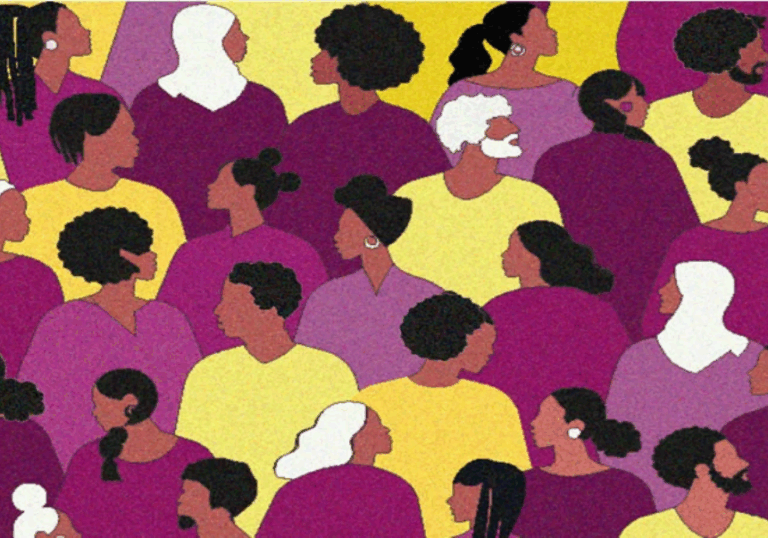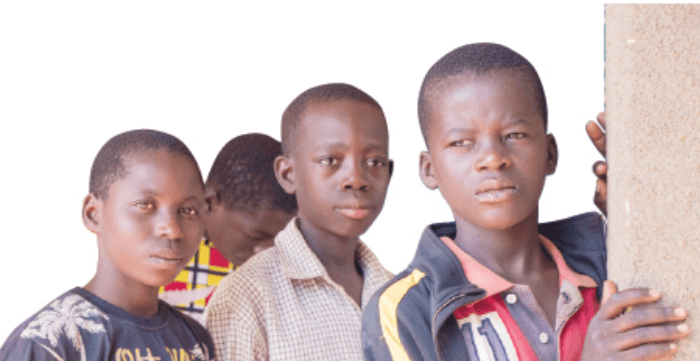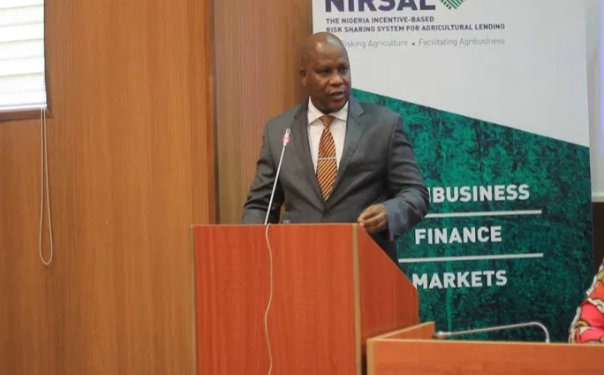The village of Sabo Hausawa is located Kuje. It is a 50-minute ride on a motorcycle from the popular Kuje tipper garage in the Federal Capital Territory.
The journey is strenuous due to the unpaved, bumpy, semi graded hilly roads leading in, indicating abandonment from authorities.
On this same road is a clogged stream hindering movement for both trekkers and motorcycles.
‘Cononavirus Myth’
The reporter soon comes in contact with some villagers. One of them, 55-year-old Abubakar Sabo, denounces COVID-19 as a myth.
“I don’t know it, I have not seen it, we are hardworking people, I am a teacher,’’ he said. ‘’But I came to the village to work on my farm. I heard when I went to Kuje that there is a disease called coronavirus, and we have to wash our hands, but we know this thing is not possible in the village.’’
Nonetheless, the ‘unbelieving’ Mr Abubakar expresses the fear that the virus may likely spread in the community because the rural dwellers still attend religious activities ‘’and go for community gatherings’’.
“We believe in God, it can’t come to the poor, it’s for the big men, you will see them as you enter the village,” he said.
Like Mr Abubakar, some other residents of Sabo Hausawa, Sabo Marai, Shazhi, and Rubochi, who spoke with PREMIUM TIMES, said they have only heard of coronavirus from fellow farmers, ‘’who went to sell in town, and they were chased back because of the lockdown’’.

The federal government has placed Ogun, Lagos and the FCT under lockdown to curb the spread of the disease.
Raging scourge
Nigeria, with an estimated population of 200 million, has over 1, 300 confirmed cases of COVID-19 and over 30 deaths as of April 28. These numbers are, however, far from the true reflection of the situation as the Nigerian Centre for Disease Control (NCDC) has been widely criticised for not carrying out enough testing.

But, as the virus continues to ravage the world, it may be difficult to combat the virus in rural communities and prevent community-level transmission due to the peculiarity and structures of these communities.
Communities in Abuja and Lagos, the two locations with the highest number of cases, face potential danger of COVID-19, first to non-observance of government measures, secondly, to unavailability of clean water for handwashing and, thirdly and dangerously to the confidence that comes from their belief that the virus does not exist among others.
PREMIUM TIMES observed that a major challenge in the fight against COVID-19 in Nigeria is the fact that these villagers do not believe the ‘novel coronavirus’ story, at least many of them told PREMIUM TIMES.
Some of them say it was just another ploy to siphon money from the nation’s coffers and deceive the people. Nevertheless, they reckoned that even if the disease is real, it was for the rich and maybe a punishment for those in power.
Sensitisation, a major problem
A 30-year-old woman, Zulu Muhammed, said no government agency, health specialist, or local government ‘’has come to tell us what coronavirus is and what to do to avoid it’’.
“They told us they are bringing food and money for us, and we are waiting,” she said.
When asked if she has heard about the measures of washing their hands with soap, water, and rubbing of sanitisers, Mrs Muhammed said this is not feasible.

“My husband has two wives and we are 10 living in this house which only has three rooms, so you want us to observe the washing of hands,’’ she exclaims. ‘’At least you’ve seen our house is far from the borehole which usually stops 11 to 12 (a.m.) every day, then we resort to hand pumping water, once that stops, we all head to the stream.’’
She said that the government needs to sensitise the villagers ‘’before they will believe them’’.
“How do you expect us to buy soap and sanitisers when we have not eaten, I have never seen a sanitiser before self, you people are funny. Coronavirus cannot get here, we are serving God,” she said.
Some community elders in Sabo Barai and Rubokya lamented that no government officials or organisation has been to the villages for distribution of palliatives and sensitisation of the community.
Dearth of basic amenities
Located at the centre of Angwan Barai, and not too far from Chida stands the borehole and hand pumping borehole that serves the communities.
The reporter observed how women and young girls put their buckets on the floor to form a queue in order to get water. Their cluster defeats the social distancing measure the authorities advocate to curb the spread of coronavirus.
Setu Samadu said there is no way to practice social distancing and frequent washing of hands here.
‘’You can see how we are rushing to fetch water,’’ she said. ‘’I was lucky to get water to wash this morning, else, I will be on my way to the stream. We have been forgotten. They (government) have abandoned us, go to the health centre and see how it is. I don’t believe any government.’’
A visit to the only primary healthcare that serves seven communities depicted either abandonment or lack of maintenance.
The centre is designed to cater for Sabo, Pebiri, Chida, Hurusu, Ibadan, Rubokya, and Alhaji Mamman communities.

The only health personnel in the centre, Dabana Sarkiya, said he usually visits the communities ‘’to educate them on coronavirus and the symptoms.’’
“I have told them what the symptoms of coronavirus are and if they observed anything similar, they should alert me, and we will send for an ambulance. You can see there are no patients in the wards,” he said.
He, however, corroborated what the villagers said on low sensitization by the government.
According to him, ‘’nobody has come to give me or the community health talks. I only teach the people what I get as SMS.’’
When asked why a pamphlet on COVID-19 he showed the reporter was written in English when most of the residents can’t even speak or write in English, Mr Sarkiya said he usually translates it for them.
But the majority of those we interacted with said they have not received a visit or talk by Nigerian health officials.
Lagos communities
PREMIUM TIMES also paid a visit to a community with over 1,000 residents in Eti-Osa local government of Lagos. The residents at New road in Badore Ajah are those from the Benin Republic who resettled in Nigeria.
These persons do not have access to potable water, and other amenities are alien to them as this newspaper observed they take their bath in the river and cook with the same polluted water.
“There was a time we planned having a borehole but we cannot donate money for that. Some persons hardly get money to feed their families, and it will be injustice asking such person to donate money for water,” Ebenezer Apoi, a resident of the community, told PREMIUM TIMES.
Residents said they are not bothered about the virus as normal business activities still take place. When PREMIUM TIMES asked, the villagers said they lack knowledge about preventive measures to curb coronavirus.
In Langbasa and Ado, the stories remain the same
Many families in Langbasa area of Lagos were seen in ramshackle rooms where potable water is alien and residents find it difficult to purchase sanitisers.
“The major challenge I have is that you cannot expect me to use the little money I have to buy soap and sanitiser when my children are hungry.
“While the government promised palliative, we did not get anything. It becomes a major challenge for us to eat. I believe that with God, coronavirus won’t find its way in my family,” Tope Makanjuola, says.
At Ado, many of the rented rooms here house six or more persons.

“It is only somebody that is living in a conducive environment that can isolate (quarantine) themselves. I stay in a compound with more than 40 persons. Now tell me, are all going lock ourselves in the room. What are we going to eat? There are a lot of issues to be resolved. Self-isolation (quarantine) is a daydream,” a resident said.
Curbing scourge
Different strategies for curbing the spread of the coronavirus have emerged in different countries but one has cut through everywhere.
It is simple on the surface and, supposedly, can be done by anyone: “Wash your hands with water and soap for at least 20 seconds.”
This advice takes abundance of safe water for granted, but in many parts of the world, Nigeria also, clean freshwater isn’t guaranteed. Where it is, it may be in scarce supply.
According to the World Health Organisation, frequent and thorough hand washing can help reduce your chances of contracting infectious diseases such as COVID-19.

Global statistics for 2017 revealed that poor sanitation and limited access to hand-washing facilities contributed to around 1.5 million deaths. Nearly 2.2 billion people are currently living without safely managed water outlets, and around 22 per cent of healthcare facilities in the least developed countries lack basic water services.
The World Bank reported that around 75 per cent of people living in rural areas live in homes that lack adequate facilities for handwashing.

Closely related to the issue of lack of pipe-borne water are sanitation facilities and decent accommodation for most people in Nigeria. This fact alone constitutes a major hindrance to the attempts at containment of the pandemic. Regular hand-washing under a running tap for presupposes that people have clean and running pipe-borne water. Sadly, this is not so in many communities in Nigeria.
Experts weigh in
A professor of microbiology from the University of Nigeria, Ifeoma Ezeonu, said the government needs to address the issues of basic amenities in communities.
“When we are talking about washing of hands, the people we are really talking to are the ones that can access water,’’ she said. ‘’If you ask people in the rural area who do not have water or hardly have water for their domestic use to wash hands consistently, they will see it as waste.”
She advised that governments should look into providing water for the communities.
‘’Awareness campaign need to go beyond radio and television, there must be community sensitization. Now the awareness campaign should be going to communities and slums so that these people can practice the preventive measures to avoid the spread of community-level transmission of the disease,” she said.
Also, a public analyst, Gbolahan Olojede, said the problem is that people at the grassroots have not been involved in containing the spread of the disease.
“The measures to really deal with containing the spread of the virus is involving people at the local government level: councillors, leader of the mosques and churches, etc. They will educate their members,” he said.

“This report was facilitated by the Wole Soyinka Centre for Investigative Journalism (WSCIJ) under its COVID-19 Reality Check project.”



